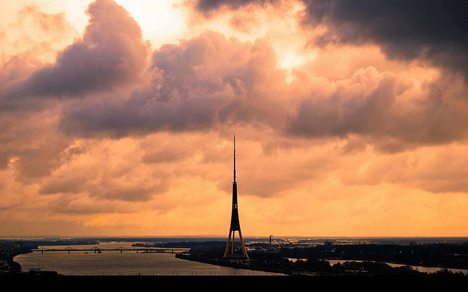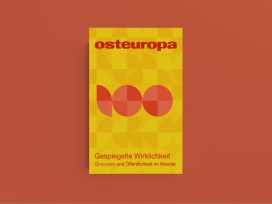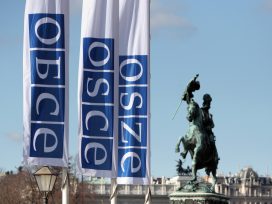Wojciech Przybylski: I’d like to begin with the goals of the new NATO Strategic Communications Centre of Excellence in Riga. What is it and why was it established here?
Janis Karklins: The purpose of the NATO StratCom Centre of Excellence is to contribute to the capability of NATO in the new information age and to achieve its political and military objectives by using existing information disciplines and opportunities provided by new technology. In practice, this means understanding the new and ever-changing media environment and seeing how to respond to the use of these new media tools by adversaries and to develop methods for how new tools could be used by the Alliance during peacekeeping and others kinds of operations.

Riga skyline with the TV tower, 1 April 2008. Photo: Desmond Kavanagh. Source:Flickr
Generally, we work in three directions – analytical, operational and educational – which are interlinked, and we engage with academia and practitioners to produce analysis and recommendations.
WP: To what extent is StratCom’s activity targeted towards voters and audiences of NATO member states and how much is it to communicate outside the members of NATO?
JK: By definition NATO is not allowed to work and influence its own population; it is simply forbidden. And in order to use military applications in operations outside NATO, to my knowledge, special permission is needed from the North Atlantic Council (NAC). So, this is what differentiates NATO from Russia, which uses information against its own population.
WP: In fact, we have known this for a year and half, when the Kremlin actually issued a public tenure for the manipulation of public media. What countermeasures are there with regard to trolling and providing false information on the Internet?
JK: First and foremost, it is a matter of raising awareness of the methods that are used, explaining what trolls are, how they operate and what their targets are. There is one very simple remedy, although it will not have an immediate effect: I strongly believe that information literacy should become a part of every school curriculum so that it is part of the education provided in primary and secondary schools: children need to acquire certain skills that will help them to orient themselves in and distil this deluge of information, including the disinformation that is present on the Internet.
Raul Rebane: I would add that in Estonia we have some experience of the information war, especially in the context of our own cyber centre. It was established in 2007 when the Estonian state was under cyber-attack for the first time. We saw developments in Latvia similar to those in Estonia. We are very happy that Latvia is establishing this centre in Riga. And Estonia supports its development. To take it even further, an article was recently published in Estonia in which the former prime minister, Mart Laar, wrote that Estonia needs a psychological defence centre. This is all connected; consider what’s been going on during the last twelve months in Russia.
WP: How applicable will your work be to the Baltic states and what scope is there for expanding upon this programme in the context of NATO or eastern European?
RR: From our point of view we want to see as much deep cooperation among the Baltic states as possible, because we have a lot of information. Estonia can work with this new centre in Riga and we will provide input because we have everyday experience. There was talk at the Riga Conference 2014 about launching a Russian-language television channel. We did some research in 2006 and 2007 on that. I am not very optimistic about a pan-Baltic channel because the cultural differences are quite large. Two days ago, the Estonian government had a meeting about how to strengthen Russian-language media in Estonia and there was quite a lot of money assigned to different spheres, but the question of channels remains open; it will probably come at the end of 2015.
WP: Russia has been very active in this field for some time. So why are you only starting this centre now? And suppose the conflict between Ukraine and Russia does not last much longer and the media war slows down. How sustainable will the centre be in the long term?
RR: The theory of psychological war and the operations in the Baltics have been evolving for ten to 15 years, maybe longer. It is nothing new to us. But what is going on at the moment in Moscow, the end of media and the end of journalism, is surprising even for us. Some people think that Facebook and Twitter only have another year left in Russia. Though hard to imagine, this could prove to be true. We have to learn very fast.
We have to ask ourselves the question: what is journalism? Is it truth? It is a very deep and important question. Journalism is not truth. There are two important parts to journalism: choice and change of meaning. As a journalist, you can choose. There are millions of topics to cover. And then you can change the meaning. You can write about the case of the Estonian security guy who was arrested on Estonian territory, you can say he is an ordinary police worker on the border, or a spy, or hundreds of other things about him. But in fact, we are working with communicable versions of reality, and if you look at the evening news, you will see totally different versions of reality.
WP: But the point is not about what version is being covered. It is about manipulation…
RR: And we have to work with that because people believe it. And this is the problem. Around 85 per cent of the Russian people believe that taking Crimea was the right thing to do. We have to understand the whole landscape around the emotional attitude to information, which has never been like it is now and which is why we need a theoretical, scientific approach; and the people at this centre are doing this.
JK: It is very difficult to talk about journalism in a classical sense because we know what defines a journalist and we know the features of free, independent and pluralistic media. What we see happening now has created a lot of questions whether professional journalism still exists in Russia. And it does in alternative and online media, but it certainly questions the professionalism of those journalists on the main television channels who do not follow journalistic ethics.
As we saw on a number of occasions in the Ukrainian operation, journalists were simply lying and pictures were used from different parts of the world, even Venezuela, and presented as what was happening in Ukraine. This is not journalism. This is propaganda. And these aren’t journalists, they are agents of propaganda. We may seriously question journalistic ethics in Russia. Of course, it is up to Russian journalists which way they want to choose and what journalism they want to practice.
RR: I don’t think we can talk about journalism at the moment, certainly not with regard to the main television channels: in Russia they often use the expression “power vertical”. At the moment, I use the expression “information vertical”. Information comes from top to bottom, something that’s quite clear when I see the different television programmes.
WP: To give you a counter example, if you have news in Poland, and there are a variety of channels, without Russian intervention, you come to a situation where three or even more media report on the same story in more or less the same way. This is not “vertical power” or “vertical information”, but it is a simple fact that media practice is now of a lower quality and information comes from the national press agency. So the challenge is perhaps greater than it may at first appear, when I ask what the audience is, what the scope of interest is, at least, when you prepare analyses and operations, as we are also a fragile western-style democracy.
JK: The Internet is changing the media landscape dramatically and it is undermining the existing, long-standing economic model of the media; and unfortunately in the last ten years we have not been able to find an alternative model which would help media outlets survive and maintain the same level of engagement. We have not yet found an economic model that would allow media outlets to get sufficient income to produce high quality products. This is indeed a challenge. It also influences the way in which the media works, something that we see everywhere in the world, including the western democracies.
RR: There is one very basic question and we have researched it a lot. The issue is this: the media structure and objective information cannot work, in many cases, on a market basis in small states, such as Latvia and Estonia. We simply do not have enough resources. This means that public services like broadcasting, for example, are extremely important, and you have to support them. In other words, public services in countries like Estonia and Latvia are a vital part of the information system. We have to pay for them because we are so small.
JK: This new economic model has not yet been found. On the other hand, you have to remember that there are seven-plus billion people in the world and only three billion have access to information (and not all of those have daily access). I do not expect a revolutionary change in media consumption. Any change will be gradual and we need to find a way of combining traditional media and new forms of media to reach out to all populations; otherwise we start discriminating against those who are less technologically advanced.
WP: Research programmes aside, the information war is happening right now. What are your short-term goals? Is there an effect to be expected in the current flow of information and the media war currently taking place? Can we expect to see your centre’s activities playing a role here?
JK: Our report on what we have accomplished so far contains some practical suggestions on what needs to be done, including in Latvia, and we are talking about improving the public service and paying more attention to the quality of news that the public service prepares in all languages. The report says that we need to think about the professional training of journalists so that they understand what is going on better and can also contribute to the better understanding of the population. And then, of course, there are longer term objectives or recommendations that cannot be implemented immediately.
RR: I would add, however, that in 2002 and 2006, when we were already on the frontline of an information war in the Baltic states, we tried to explain to our allies and western partners that the situation was serious. Many people did not believe us. We had a seminar in 2007 in Tallinn about information wars and there were something like twenty reports and only one about Russia. Nobody considered Russia to be a threat. Back then we were considered to be suffering from post-Soviet trauma and paranoia. But now, our experience and expertise can be very valuable.
The information war is not about journalism or ordinary life. We have to recognize that it is about targeted, paid-for informational influence on our people and our societies. We have to fight certain new versions of history; we see how the minorities get different types of information and we see the cyberwar that is very important to Latvia, Estonia and Lithuania. One of the main tasks of this centre is to inform our allies and make them believe that this information war is real.
WP: When you look at what is happening on the Internet, the kind of tools that are being used in order to form people’s opinions, the role of advertising has played a strong and predominant role. How much time and focus will be assigned to political communications and how broad can you be in the research that you are undertaking? I understand the aims of the centre, but I have some doubts about the scope of the research when you try to implement it.
JK: It is very difficult to say. Obviously, social media and social networks will be one of our areas of interest and study; especially from the point of view of how social media can be misused or used for purposes for which social media was not intended. When social media emerged, it was to connect people so they could exchange pictures and stay in touch. Now, we see that social media is used for other purposes including disinformation and undermining opinions. We see that people are specifically paid and tasked to provide or react to messages which are not favourable to a given ideology. The phenomenon has a name – trolling. Some are actively using trolls in order to pursue certain goals. First of all, the centre aims to understand this phenomenon and to explain it to those who are not confronted with social media in their daily routines. In that respect we will be at the forefront of research activities related to questions of defence.
RR: I am reminded of a very interesting recent and ongoing example in Estonia. We have a serious problem with anonymous commenting. A lot of people were insulted and attacked; since media is totally free in Estonia, people can write what they want. It has become a huge problem as many people have actually exited some media out of fear of attacked by trolls. We did some research and organized several seminars based on the research and it had a huge impact on society. We discovered that “anonymous serial commentators” make up only a small part of society – 0.3 per cent of all commentators. Within one year, from September 2013 to now, the influence and the fear of such comments dropped dramatically. We consider this to be a real “victory” and a good influence on society. But it needed research and a scientific approach to the problem.
WP: Does it also apply to hate speech on the Internet?
RR: Absolutely. We simply tried to find out who these people are, why they are doing it, and how many of them there are. It appeared to be an extremely small part of society that has far too much information and power. We consider this research to be a real success. It was organized and funded by the Open Estonia Foundation. The resonance and feedback in society was immense, with tens if not hundreds of interviews.
As a result, we have now organized some research on Russian influence on Estonian Russians: how they use media, where they get their information from, and who they believe regarding what is going on in Ukraine. The results promise to be very, very interesting.







